|
|
|
Sort Order |
|
|
|
Items / Page
|
|
|
|
|
|
|
| Srl | Item |
| 1 |
ID:
130866


|
|
|
|
|
| Publication |
2014.
|
| Summary/Abstract |
Curbing corruption is vital for China's future. But the exposure of corruption cases can only damage public confidence in the CCP and the state more generally. Corruption associated with toxic food, bogus medicines, grave abuses of power and criminal 'black societies' has produced a series of public scandals in China. Without reform, further occurrences could rapidly erode the legitimacy not just of the police and other judicial organs, but also of the ruling Chinese Communist Party (CCP). The recent trial of Bo Xilai, the former Chongqing party secretary and member of the party's elite 25-member Politburo, showcased the kind of corruption that China's past president Hu Jintao warned could lead to 'the collapse of the Party and the downfall of the state'. In 2011, the Bank of China inadvertently reported that between 1994-2008 as many as 18,000 corrupt officials had fled the country for destinations in Europe, America and other parts of Asia, plundering an estimated $120 billion from state-owned enterprises and other criminal activities. The costs of maintaining domestic public order have also grown rapidly, and, for the first time, domestic security outlays approved by the 2012 National People's Congress (NPC) exceeded defence, in part over concerns about the growth of mass protests, fraud, corruption and organised crime, and the need to strengthen weiwen (stability) and social harmony.
|
|
|
|
|
|
|
|
|
|
|
|
|
|
|
|
| 2 |
ID:
122009
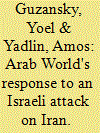

|
|
|
|
|
| Publication |
2013.
|
| Summary/Abstract |
In a television interview in November 2011, former head of Mossad Meir Dagan warned that an Israeli attack on Iran's nuclear facilities could lead to a regional war involving actors such as Hizbullah, Hamas and Syria. Israeli Prime Minister Benjamin Netanyahu has had a different view. In October 2012, he told French magazine Paris Match that such an attack would stabilise the Middle East:
Five minutes after, contrary to what the skeptics say, I think a feeling of relief would spread across the region … Iran is not popular in the Arab world, far from it, and some governments in the region, as well as their citizens, have understood that a nuclear-armed Iran would be dangerous for them, not just for Israel.
US officials, however, predict that Arab states would have a strong reaction to an independent Israeli attack. Such an assault is likely to sever Israel's already limited diplomatic relations with Arab states, they argue, and may destroy its peace treaties with Egypt and Jordan. Washington believes that an attack would give rise to popular protests in the Arab world, forcing its leaders to act.
|
|
|
|
|
|
|
|
|
|
|
|
|
|
|
|
| 3 |
ID:
187620
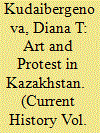

|
|
|
|
|
| Summary/Abstract |
Recent events in Kazakhstan show that political art has the potential to be a potent form of protest in some of the most authoritarian states in contemporary Central Asia. After the collapse of the Soviet Union, artists in Kazakhstan and elsewhere in the region began turning away from the canon of Socialist Realist art, with its sole aim of serving the regime and depicting its visions of the future. New forms of contemporary art emerged, drawing sharp contrasts with official art in form, content, and culture, as more artists insisted on freedom from state patronage and control. In the political upheaval following the resignation of long-ruling President Nursultan Nazarbayev, artists have inspired protests with pointed critiques.
|
|
|
|
|
|
|
|
|
|
|
|
|
|
|
|
| 4 |
ID:
132973
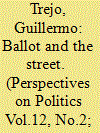

|
|
|
|
|
| Publication |
2014.
|
| Summary/Abstract |
This article presents a new explanation of the widespread occurrence of cycles of protest in electoral autocracies - the most common type of authoritarian regime in the world today. Because multiparty elections in autocracies are partially free but unfair, opposition parties are compelled to compete for office while contesting the rules of competition. To fulfill this dual goal, opposition parties actively seek to recruit a wide variety of independent social movements who can provide votes and lead major mobilizations during election campaigns and in post-election rallies to denounce fraud. Because electoral participation can cause divisions within social movements, social activists join socio-electoral coalitions when opposition parties offer them financial and logistic resources and institutional protection to mobilize for their causes during non-election times. This quid pro quo explains how isolated protest events become aggregated into powerful cycles of mobilization and why protest is more intense during elections but persists beyond election cycles. When political liberalization leads to increasingly free and fair elections, the prospect of victory motivates opposition parties to discourage radical mobilization, bringing cycles of protest to an end. Drawing on an original database of indigenous protest in Mexico and on case studies, I provide quantitative and qualitative evidence of the causal impact of electoral incentives on the rise, development and decline of a powerful cycle of indigenous protest as Mexico transitioned from one-party to multi-party autocracy and into democracy. Beyond Mexico, I show that the introduction of multiparty elections in a wide variety of autocracies around the world gave rise to major cycles of protest and discuss why the relationship between the ballot and the street is a crucial factor for understanding the dynamics of stability and change of authoritarian regimes.
|
|
|
|
|
|
|
|
|
|
|
|
|
|
|
|
| 5 |
ID:
188647


|
|
|
|
|
| Summary/Abstract |
Even before the Arab Uprising waves, the grievances of increased demands on services and subsidies, shifting economic policy, the deteriorating core-periphery relations between Amman and erstwhile major centers in the Jordanian hinterland (e.g., al-Karak, Maʿān, al-Ṭafilah) have all characterized one aspect of the delicate balance of power in the Hashemite Kingdom. This article will examine the nature of this deterioration, and how the monarchy has variously conceded to, repressed, and thereby withstood repeated protests emanating from the hinterlands. Finally, this article examines a case study of the city of Maʿān as a bellwether hub of popular protest in Jordan.
|
|
|
|
|
|
|
|
|
|
|
|
|
|
|
|
| 6 |
ID:
174031
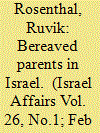

|
|
|
|
|
| Summary/Abstract |
This article explores the changing voice of bereaved parents in Israel from 1948 to the present. Until the early 1980s, bereaved parents did not express their grief or protest publicly. Their bereavement was a strictly private matter. In 1982, shortly after the outbreak of the First Lebanon War, their grief and protest burst into the public sphere. From then on, their voice gained momentum and legitimacy and in time directly impacted the political decision-makers. The article defines four phases in the changing content, tone and style of parental bereavement – hidden, political, privatized, and moral – by analyzing and comparing six representative texts.
|
|
|
|
|
|
|
|
|
|
|
|
|
|
|
|
| 7 |
ID:
160682
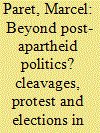

|
|
|
|
|
| Summary/Abstract |
Declining electoral support for South Africa's ruling party, the African National Congress (ANC), suggests a potential weakening of the anti-apartheid nationalism that defined the immediate post-apartheid period. Using two surveys of voters in primarily poor and working-class black areas, conducted during the 2014 (national) and 2016 (local) elections, as well as three case studies of protest by workers, poor communities and students, this article examines the social cleavages and political dynamics that underpinned deepening political competition. Results show that voting decisions varied according to gender, age, ethnicity and receipt of welfare benefits. Different public provisions mattered most during national versus local elections, demonstrating that voters paid close attention to government operations. Underscoring political fluidity, some instances of protest reinforced ANC dominance while others fed into support for the opposition. The findings challenge notions of uncontested one party dominance, revealing instead that some poor black voters are critically evaluating the ANC's performance and developing oppositional political identities.
|
|
|
|
|
|
|
|
|
|
|
|
|
|
|
|
| 8 |
ID:
153377
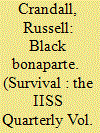

|
|
|
|
|
| Summary/Abstract |
The revolt of African slaves that erupted in Saint-Domingue in late August 1791 occurred in France’s most lucrative New World colony. Encompassing the western third of Hispaniola Island since 1659 and representing the most ‘profitable stretch of real estate on the planet’ according to historian Edward Baptist, the colony’s sugar, coffee, indigo and cotton served as the fuel for France’s ‘imperial engine’.1 Now, its sugar plantations were ablaze as slaves torched cane fields and killed their masters. With France’s own revolution having begun in 1789, free people of colour in Saint-Domingue also took up arms after French landowners refused to extend citizenship to them as laid out in the Declaration of the Rights of Man and of the Citizen. An independent Republic of Haiti was eventually established on 1 January 1804; by then, upwards of 350,000 Haitians and 50,000 French troops had been killed (the troops mostly from yellow fever), and the island nation’s economy lay in tatters.2
|
|
|
|
|
|
|
|
|
|
|
|
|
|
|
|
| 9 |
ID:
182589
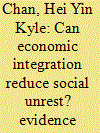

|
|
|
|
|
| Summary/Abstract |
When dealing with autonomous regions, states may utilize Unionist Economic Integration (UEI) programs to forge a stronger sense of unionism. However, the literature has not been able to explain why UEIs work differently across regions. With the identical UEI implemented in Macau and Hong Kong, Macau seems to be firmly within Beijing's grasp, yet protests in Hong Kong are still intensive. Why is economic integration effective in appeasing some regions, but not others in the same polity?
I argue that what makes UEI effective in appeasing a region is the region's economic dependence on the national center. UEIs add to the expected cost of contention, and thus high economic dependence sets that baseline to a higher degree, leading to effective appeasement with UEIs. I illustrate my argument with empirical analyses of two original datasets of protest counts and discontent with authoritarian institutions in Hong Kong, Macau, and Chinese provinces.
|
|
|
|
|
|
|
|
|
|
|
|
|
|
|
|
| 10 |
ID:
156298
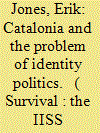

|
|
|
|
|
| Summary/Abstract |
The 1 October Catalan referendum on independence was a trap for Madrid. Spain’s political leaders were bound to be criticised whether they ignored the vote or tried to stop it. Shunting responsibility for dealing with the crisis onto the courts and the police was no way out. The voters in Catalonia know that. Now the Spanish government will be held to account. Political leaders everywhere should pay attention.
|
|
|
|
|
|
|
|
|
|
|
|
|
|
|
|
| 11 |
ID:
079962
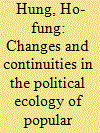

|
|
|
|
|
| Publication |
2007.
|
| Summary/Abstract |
This article will delve into the historical roots of Chinese environmentalism. A wave of recent research has unearthed numerous instances of Chinese state-society conflicts, as well as the ecological crisis precipitated by drastic population and commercial growth in 18th-century China. Based on a survey of protest events derived from archival sources, this contribution analyzes how the mounting ecological crisis and falling capacity of the Qing state in the 18th and 19th centuries generated changing forms of popular protests as responses to the "externalities of development." It is found that when the Qing's regime capacity peaked in the early 18th century, most popular protests were peaceful and were resolved through compromises between officials and protesters. Amid the administrative breakdown in the 19th century, however, many protests escalated into violent confrontations, while others developed into "appeals to the capital" (jingkong ), a litigation process that enabled local communities to seek the support of the central government in their struggle with predatory local officials. Remarkably, some repertoires and patterns of environmental protests in contemporary China can be traced back to the Qing times, which raises questions about whether today's environmental protests are completely novel, or whether certain continuities are inherent in the deep-seated tradition of state-society conflict and negotiation in China's late imperial history
|
|
|
|
|
|
|
|
|
|
|
|
|
|
|
|
| 12 |
ID:
122014
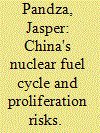

|
|
|
|
|
| Publication |
2013.
|
| Summary/Abstract |
Just days after the March 2011 Fukushima accident, China's State Council suspended approvals of new nuclear power plants and created a range of rigorous measures aimed at improving the country's nuclear-safety provisions. It was not until October 2012 that the council cautiously lifted the ban on new construction. Then-Premier Wen Jiabao announced that all newly approved reactors would need to meet third-generation criteria, meaning that they should have certain advanced inbuilt safety features lacking in most conventional second-generation reactors. China's actions demonstrate a new resolve among its leadership to give greater consideration to the safety, rather than the economic benefits, of nuclear power. Fukushima caused concern that a similar accident in China would put the government's nuclear programme, which is the fastest growing in the world, at serious risk. Of even greater concern was the possibility that an accident could strengthen opposition to the rule of the Communist Party.
|
|
|
|
|
|
|
|
|
|
|
|
|
|
|
|
| 13 |
ID:
195994


|
|
|
|
|
| Summary/Abstract |
Do disadvantaged ethnic groups favor violent over nonviolent conflict tactics? To understand when and why civil war breaks out, we need to study violent and nonviolent forms of conflict together, using analytical tools that can account for the choice between them. Yet, most large-N analyses of the causes of civil war do not account for nonviolent conflict, and vice versa. Because the mechanisms held to link horizontal inequalities to civil war closely resemble those used to explain largely nonviolent social movements, this article studies group disadvantages, political violence and nonviolent resistance together. To reduce concerns about selection bias in horizontal inequality research, it extends the analysis to socially as well as politically relevant groups around the world. A consensus is emerging that politically disadvantaged ethnic groups shun nonviolent tactics, because they lack ties to people close to the regime and its institutions. This article challenges the consensus, by showing that political group disadvantages predict nonviolent as well as violent forms of conflict. Groups’ economic status helps explain tactical choices. Among economically advantaged groups, political disadvantages increase the risk of nonviolent conflict. Among the economically disadvantaged, they facilitate violence. This pattern is strongest in situations where no policies are in place to remedy group disadvantages, in authoritarian and less economically open societies, and in analyses that account for conflicts of low intensity, to capture onsets early. The results point to the importance of economic and other forms of leverage, which have been largely overlooked in the econometric literature.
|
|
|
|
|
|
|
|
|
|
|
|
|
|
|
|
| 14 |
ID:
110804


|
|
|
|
|
| Publication |
2012.
|
| Summary/Abstract |
Much of the debate over the security implications of climate change revolves around whether changing weather patterns will lead to future conflict. This article addresses whether deviations from normal rainfall patterns affect the propensity for individuals and groups to engage in disruptive activities such as demonstrations, riots, strikes, communal conflict, and anti-government violence. In contrast to much of the environmental security literature, it uses a much broader definition of conflict that includes, but is not limited to, organized rebellion. Using a new database of over 6,000 instances of social conflict over 20 years - the Social Conflict in Africa Database (SCAD) - it examines the effect of deviations from normal rainfall patterns on various types of conflict. The results indicate that rainfall variability has a significant effect on both large-scale and smaller-scale instances of political conflict. Rainfall correlates with civil war and insurgency, although wetter years are more likely to suffer from violent events. Extreme deviations in rainfall - particularly dry and wet years - are associated positively with all types of political conflict, though the relationship is strongest with respect to violent events, which are more responsive to abundant than scarce rainfall. By looking at a broader spectrum of social conflict, rather than limiting the analysis to civil war, we demonstrate a robust relationship between environmental shocks and unrest.
|
|
|
|
|
|
|
|
|
|
|
|
|
|
|
|
| 15 |
ID:
185645


|
|
|
|
|
| Summary/Abstract |
Protests in Hong Kong over plans to allow extradition from Hong Kong to mainland China is going on since mid-2019. These reforms are seen as a threat to Hong Kongers’ freedom. The protesters expanded their demands for democratic reform and opposition to Beijing’s introduction to a new national security law. Following the continued protests, the UK government invited over five million Hong Kong residents to relocate to the country. The purpose of this article is to delve into why the UK welcomes Hong Kong residents to apply for citizenship. During the economic impact of COVID-19 and Brexit on the UK, this invitation raises questions about its intention. Since the Brexit referendum, immigration has plummeted, perhaps resulting in a labour shortage. This study has significant policy implications for Hong Kong, China and the UK.
|
|
|
|
|
|
|
|
|
|
|
|
|
|
|
|
| 16 |
ID:
124245
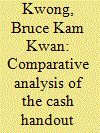

|
|
|
|
|
| Publication |
2013.
|
| Summary/Abstract |
In 2011, Hong Kong SAR government announced an unprecedented policy of cash handouts of 6,000 HKD to all permanent residents at the age of 18 or above as a means of defusing public discontent with economic policy and poor governance. Macau SAR has also been distributing similar cash handouts since 2008 to temper public dissatisfaction and widespread demonstrations. Initially, both SAR governments were very reluctant to initiate universal cash handouts. Unlike standard welfare programmes that are budgeted for annually, the cash payment scheme in Hong Kong SAR was a one-off handout. In Macau SAR, however, the payment scheme went from being a short-term policy to a long-term policy, while other welfare programmes were also allocated more public money. This paper argues that although such cash handout policies are avoidable, they are still being adopted by politicians who place self-interest above the public interest.
|
|
|
|
|
|
|
|
|
|
|
|
|
|
|
|
| 17 |
ID:
142038


|
|
|
|
|
| Summary/Abstract |
Violent domestic conflicts spread between countries via spillover effects and the desire to emulate events abroad. Herein, we extend this emulation logic to the potential for the contagion of nonviolent conflicts. The spread of predominantly nonviolent pro-democracy mobilizations across the globe in the mid-to-late 1980s, the wave of protests in former Soviet states during the Color revolutions in the 2000s, and the eruption of nonviolent movements across the Middle East and North Africa during the Arab Spring in the early 2010s each suggest that the observation of collective action abroad encourages a desire to emulate among potential challengers to domestic autocrats. However, the need to emulate varies. Potential challengers with a recent history of protest at home are less dependent (than are those without similar experience) upon foreign exemplars to mobilize the participants and generate the resources required to make emulation practicable. By contrast, where the domestic experience of protest is absent, opposition movements are more reliant upon emulation of foreign exemplars. We test the implications of this logic using a series of multivariate logistic regression analyses. Our tests employ data on nonviolent civil resistance mobilizations that occurred across the global population of autocratic states between 1946 and 2006. These tests, along with post-estimation analysis, provide evidence consistent with our conditional logic of emulation.
|
|
|
|
|
|
|
|
|
|
|
|
|
|
|
|
| 18 |
ID:
176187
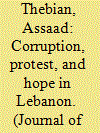

|
|
|
| 19 |
ID:
172773
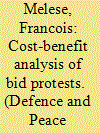

|
|
|
|
|
| Summary/Abstract |
The goal of any procurement process is to obtain ‘value for money.’ Bid protest systems are intended to help. The U.S. Department of Defense, NATO, the EU, UN, OECD, and WTO, all authorize losing bidders to protest public procurements. The threat of a protest is meant to increase government accountability, and encourage vendor participation. An extensive legal and regulatory literature discusses intended benefits of protests, but is surprisingly silent about the costs. The goal of this study is to examine both costs and benefits. Military acquisition offers an illustration. The dual objective is to minimize corruption, and maximize competition. Sadly, protest systems can inadvertently discourage both. Moreover, past protests by defense companies have generated significant costs, and triggered dangerous delays of critical defense equipment, materiel, services, and supplies required for national security. The static, probabilistic, micro-economic, partial equilibrium, representative bidder model presented in this paper offers a cautionary tale for defense organizations, government agencies, countries, and international institutions that authorize bid protests. The model reveals multiple potential deficiencies of protest systems, and recommends analysis of portfolios of alternatives to eliminate fraud and favoritism, and increase competition, to improve procurement outcomes.
|
|
|
|
|
|
|
|
|
|
|
|
|
|
|
|
| 20 |
ID:
196011


|
|
|
|
|
| Summary/Abstract |
Much of the focus of cyber conflict has been on interstate conflict. This article focuses on two interrelated questions in the important but neglected area of cyber contentious politics. First, how does the public feel about the use of different eco tactics including cyber-based tactics carried out by activists involved in the radical environmental movement, a movement that uses protest and sabotage in service of environmental causes? Second, how do anti-technology sentiment and concerns about climate change influence support for different eco tactics? To answer these questions, we conduct a survey and survey experiment on a nationally diverse sample of Americans. We find that Americans are less supportive of certain eco tactics, particularly those that involve property destruction or physical sabotage compared to cyber-based tactics. We further show that anti-technology sentiment and perceived threat from climate change are correlated with increased support for eco direct actions. Using a survey experiment we show that cyber direct actions that result in sabotage are viewed as more acceptable than kinetic actions even though they both result in the same level of destruction. Finally, we include qualitative data from interviews with activists to better understand the strategy and role that new technology and tactics play in the broader radical environmental movement.
|
|
|
|
|
|
|
|
|
|
|
|
|
|
|
|
|
|
|
|
|